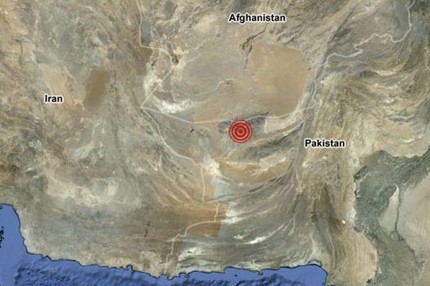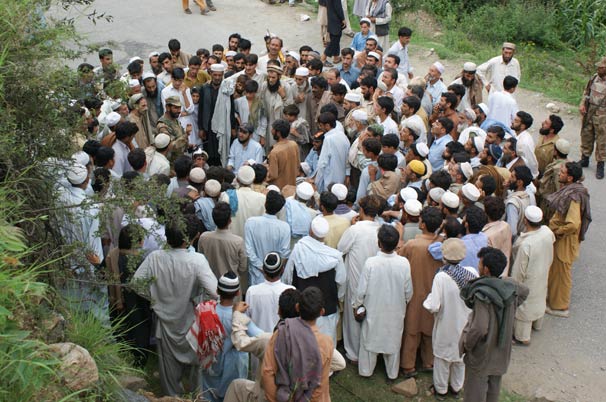ELCA Disaster Response has committed $100,000 to the CWS appeal to respond in Pakistan. This is a recent news release from CWS on the situation.
With more than 3.2 million people displaced or affected by monsoon rains and the worst flooding in north Pakistan in nearly a century, global humanitarian agency Church World Service has announced a U.S. and international fundraising appeal.
The agency reports that its aid workers in the region are continuing their initial response, providing food packages, shelter materials and non-food supplies. In addition, one mobile health unit has been dispatched so far, delivering emergency health services in Balakot.
CWS Pakistan team members report an increasing need for assistance, and say blocked roadways and communications continue to hamper aid workers from reaching cut-off survivors with vital food and supplies.
CWS Pakistan Senior Project Officer Tassaduq Hussain described the situation in Banna, Allai Tehsil, saying lack of communications and passable roads continues to hinder access to elevated areas of Allai. “Here, there is major food shortage in markets, and the condition for the people is not good.”
Hussain said teams are hoping roads will reopen today, although more rain is expected. He said the most immediate needs are food packages and shelter materials.
Elsewhere, from Sibbi, Balochistan, CWS Pakistan Senior Project Officer Saleem Dominic reported a similar situation. “Food is the initial, immediate need, with hygiene and shelter next. Houses are completely destroyed and flood water remains in the houses, which poses health risks,” Dominic said.
CWS is the first organization to distribute food in Sibbi, “for which the people are very grateful,” said Dominic.
Assessments by CWS and partners indicate survivors face grave challenges given the loss of housing, crops and livestock. Most of the affected villages are still inundated, and people in general have little to eat and no means to earn money.
CWS, other humanitarian groups and Pakistan government officials are voicing concern over the destruction of some 100,000 acres of fertile soil along the Swat River, a main source for food for 50,000 people in the area, which will take years to renew.
But for now, urgent rescue and relief continues. Church World Service plans a response to a wide geographic area, subject to change in the weeks ahead based on changing conditions and needs.
Initial CWS efforts have included providing 500 food and shelter kits in Sibbi, conducting assessments in affected areas and identifying beneficiaries, and engaging the agency’s mobile health clinic services, now providing patient examinations, essential drugs and prenatal care.
Based on assessments conducted by its staff and local partners, CWS plans to provide emergency assistance to 70,000 people in Swat, DI Khan, Sibbi and Kohistan, including food assistance to 35,000 people; emergency shelter supplies to meet the needs of 17,500 people; and mobile health access for 17,500 people in Mansehra and Swat.
Church World Service has worked in Pakistan for more than five decades and is a leading agency in promoting and adhering to international Sphere and Humanitarian Accountability Partnership standards for aid quality and accountability, and as such, focuses keenly on the quality and the nutritional value and mix of the foods distributed in disaster settings.
CWS food packages will be distributed directly to affected families at convenient food distribution points established in each community and consist of 44 lbs. each of wheat flour and rice, 4¼ lbs. each of beans and sugar, 10½ cups of cooking oil, 7 oz. of tea, and a box of iodized salt.
As well, CWS will assess the particular nutrition needs and status of children under 5 years of age in beneficiary families, to determine if supplemental food resources will be required in later weeks.
Church World Service is working with other members of the ACT Alliance Pakistan Forum as part of a coordinated response. CWS Pakistan also has planned ten introductory Sphere and HAP international standards workshops for humanitarian organizations in different Pakistan cities, to ensure quality and accountability in the Pakistan flood response.
 A 7.2 earthquake has hit a remote area of southwestern Pakistan. Today’s quake was centered in Baluchistan, Pakistan’s most sparsely populated area, according to the US Geological Service. The quake’s epicenter was centered in a remote area about 200 miles, or 320 kilometers, southwest of the Baluchistan capital of Quetta, the Associated Press reported. The quake was felt in several neighboring provinces and in major cities, including Karachi. Police from Karachi report no damage or loss of life as of now.
A 7.2 earthquake has hit a remote area of southwestern Pakistan. Today’s quake was centered in Baluchistan, Pakistan’s most sparsely populated area, according to the US Geological Service. The quake’s epicenter was centered in a remote area about 200 miles, or 320 kilometers, southwest of the Baluchistan capital of Quetta, the Associated Press reported. The quake was felt in several neighboring provinces and in major cities, including Karachi. Police from Karachi report no damage or loss of life as of now.
